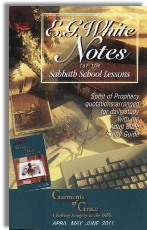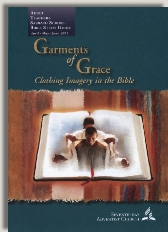|
||||||||||||||
Commentary on "The Coat of Different Colors"
Day 3: Monday, April 18, 2011 - Joseph and His Brothers
Overview
If somebody tries to use the lessons as devotional material, today's lesson is the last place where they should look. Apart from the biblical texts quoted, God’s name isn't even mentioned, much less His sovereign providence in the train of circumstances that led to Joseph's future. Instead, the meal served to the flock is a list of criminal deeds found in Jacob's family, starting with the blood-thirsty examples of Joseph's brothers who murdered an entire city with the intent of clearing the honor of their violated sister, moving to Joseph's indiscretions by which he made his brothers envious, and ending with the father's preferential behavior, a perfect storm of bad circumstances is pictured with a moral lesson drawn at the end for the alleged edification of the saints. The implied message from today's study is an indirect moral imperative: let principles guide through circumstances, not the other way around.
Observations
When sin and righteousness are biblically defined, there is a personal element involved in the definitions more than abstract principles. Sin is more than breaking a principle; sin is a personal rebellion against God which has at its basis a lack of thankfulness (Romans 1:21). This vertical dimension of man's sin, his personal dissatisfaction with God's sovereign rule, is the root of his sin. Ultimately Jacob's sons hated God who was the author of Joseph's dreams, a hate they deflected onto the dreamer. Their bad behavior was not unknown to God; still, their bigger concern was that Jacob might discover their evil deeds. They seemed to fear their father's displeasure more than God’s. Even Jacob had his own dissatisfaction with God's providence, joining the chorus of protesters when Joseph related his dreams that placed him above his entire family.
The question raised by today's lesson has a predictable answer: when confronted by threatening circumstances, sinful man will always renounce his principles because of his inborn rebellion against God. Implicitly or explicitly man blames God for everything bad happening in his life, or everything that crosses the path of his egotistical purposes. He's naturally ungrateful and rebellious, and the only way out is through God’s supernatural intervention in grace.
More moral instructions, more counsel on "how to do things", more moral persuasion will not deal with the root cause. Man must be born again from above, his soul raised from spiritual deadness in order to acknowledge his guilt, accept God’s pardon, and walk in freeness of life. Only through the gospel and through a manifestation of God's patience and grace, not through more laws and rules, more principles, man is rescued from sin and rebellion. In fact, God ultimately revealed His mercy to Joseph's brothers through Joseph himself. The law planted by God in their consciences did its work; nevertheless the effects of God's law was incomplete apart from a manifestation of grace. Grace is undeserved favor and cannot be understood until one experiences the condemnation coming from God’s law, either through the written word or through conscience alone. Mere law without a revelation of God’s grace will not lead anybody toward repentance. Surely, it can produce moralism, but it cannot produce righteous behavior. Law is powerless in producing life-transformations; it was given with the intention to work in conjunction with manifestations of God’s grace.
Summary
- The point of the story of Jacob and Joseph is not the heinous sins Jacob's sons did.
- The point of the story of Joseph is God's grace transforming and redeeming the egregious sins of his eleven brothers.
- Sinful man will always renounce his principles when he's threatened by circumstances. The only way to avoid immoral behavior is through God's supernatural intervention in grace.
- Instructions and lessons in moral behavior will not deal with the root cause of man's natural impulse to defend himself.
- Laws and principles may produce moralism, but they cannot produce transformation.
- Only when there is a manifestation of God's grace does law of any kind have a positive effect.
- God's grace is the only power or authority that can bring about change in a person. Law has no ability at all to change men and women's motives and hearts.
Copyright 2011 BibleStudiesForAdventists.com. All rights reserved. Revised April 14, 2011. This website is published by Life Assurance Ministries, Glendale, Arizona, USA, the publisher of Proclamation! Magazine. Contact email: BibleStudiesForAdventists@gmail.com.
The Sabbath School Bible Study Guide and the corresponding E.G. White Notes are published by Pacific Press Publishing Association, which is owned and operated by the Seventh-day Adventist church. The current quarter's editions are pictured above.
Official Adventist Resources
Standard Edition Study Guide Week 4
Teacher's Edition Study Guide Week 4
Easy Reading Edition Study Guide Wk 4
Search the Complete Published Ellen G. White Writings
Please Support This Project


